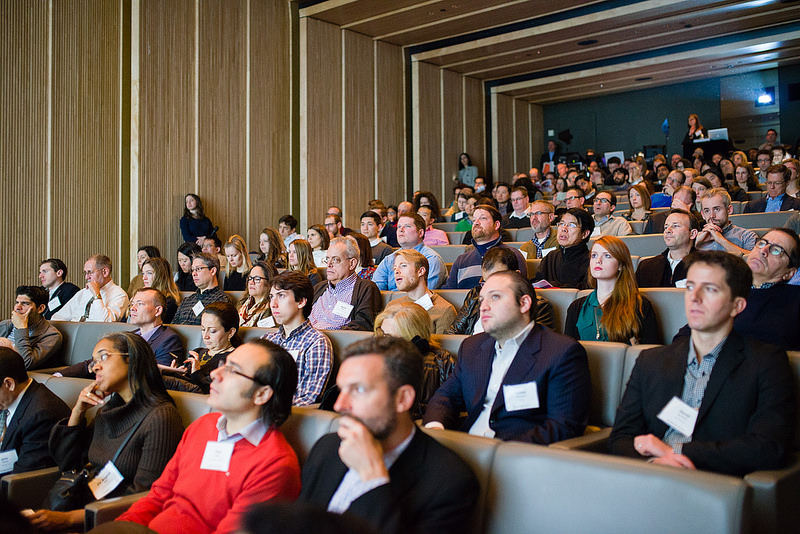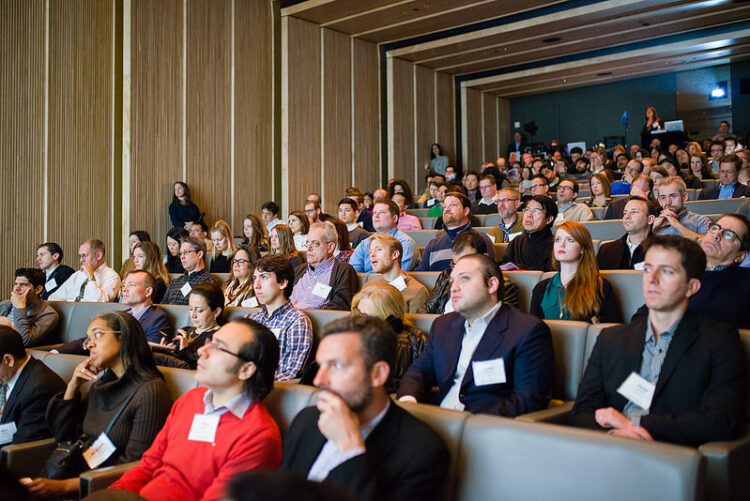
NYC’s Media Lab held its second-ever Personalizationpalooza Thursday morning, February 25th, at the Joseph Urban Theater at Hearst Tower, 300 West 57th Street. The half-day event, hosted by Hearst, featured over a dozen speakers delivering lightning talks pertaining to data science and how it can be used to deliver a more personalized consumer experience across media and tech. The sold out event was packed with entrepreneurs, startup founders, data scientists and others in the media and tech industries.
The topic of personalization has been a hot-button issue as of late, as many consumers feel that data collection is an entrenchment of their privacy rights but also crave a more personalized experience from service providers. The struggle for media and tech companies is figuring out a way to walk that thin line between collecting data for a better, more personalized user experience while not making consumers feel that their rights have been violated. Right now, if you take a look at all the major tech and media companies in the market, those that can personalize the best, lead by substantial margins. Speakers ranged from startup founders whose startups aid in recommendation and the personalization process to data scientists who process data for companies like Mashable and Spotify.
The first speaker of the morning was Hearst’s very own CTO, Phil Wiser. Wiser spoke about how Hearst, a widely successful media conglomerate, has been able to keep up with the rapid change in the world of media by collecting consumer data across their businesses to gain insight on how to create a better business outcome by producing more frequent, more personalized content. Their Director of Data Science, Rahel Jhirad, explained how they leverage machine learning to give real-time data to in-house talent, editors and sales people to determine what works, why it works and how.
Standing on the side of the consumer’s right to privacy was Roxana Geambasu from Columbia University’s school of engineering. Her talk was on the topic of the erosion of privacy as it pertains to the data-driven web. She believes there is a real need for more transparency and oversight over the web. That’s why she and her team created Sunlight, which detects data use for targeting and personalization with over 95% precision. Their hope is that by creating more transparency about data collection, it will force the service industry to act more responsibly in respects to its users.
Not all data collected on a consumer is based on what they click on and search for over the web, however. Where they live in proximity to a business can determine what kind of advertising they receive from a business. That’s exactly what Anindya Ghose from NYU’s Stern School of Business gave a talk about. He and his team have been trying to better monetize on Internet and mobile advertising using geo-fencing techniques that advertise to consumers based on their location.
Andy Hsieh, a PhD candidate at Cornell Tech, spoke about his two apps: Newsfie and Grouplink which give instant, personalized news feed for users at sign-up based on their public twitter profile.
Video has been the most dominant medium in the world of media lately. With over 800 hours of video content uploaded to the web a minute, video publishers are looking for ways to get a piece of the personalization pie. Personalizing video content for consumers is no easy feat but that’s exactly what Pancrazio Auteri, Yiannis Broustas, David Luan and Field Garthwaite aim to do with their respective companies. Pancrazio Auteri is the CTO for ContentWise, which is a content discovery platform that works to personalize TV the way that Netlflix personalizes your account. His advice? “Know your users through the stories they like.”
CEO and Founder of Rabt, Yiannis Broustas, talked about his startup and how it uses very little data to enhance user retention and engagement metrics for video content providers. Broustas said that the problem for digital video consumers is that they “are lost in a digital content ocean” so he and his team created a cheaper, faster decision making system.
Similar to this concept is Dextro, a computer vision platform that organizes video content and makes it more searchable and discoverable. Co-founder David Luan spoke on how it focuses on the macro-trends in video to make it easier to find relevant video and power stronger recommendations for consumers.
Field Garthwaite is the co-founder and CEO of IRIS.TV, a video programming platform. He spoke about how they’re focused on making video personalization “less creepy” by using Adaptive Stream, an API plugin, to customize the playback experience making users watch longer and more often, increasing provider’s ROI.
Whether you’re a giant media conglomerate, a video publisher, an app or a news site, data-driven personalization is ever-increasingly becoming the go-to for attracting and keeping consumers.
Haile Owusu gave a speech about how the folks over at Mashable use data to uncover order in viewing behavior and to determine which content would better suit a user based on the social structures they move around in.
Anyone that uses Spotify knows that it caters music to them based on their likes and listening history -this is data-driven personalization. Spotify’s Vidhya Murali, a Data Science Engineer, explained how they create vectors that outline patterns in past behavior to generate recommendations. Murali said that what they want their users “to feel as though Spotify gets them completely.”
Ranjan Roy showcased his startup, Informerly, which is a subscription-based B2B recommendation platform. He says that what makes Informerly different from other recommendation platforms is that they “think like a CRM.” Personalization to them “equals personal attention”. Choosing to be completely transparent with their users, they’ve found, has been very beneficial for them as they’re better able to gain users trust which in turn allows them to give better recommendations.
Zac Aghio, the Director of Product for Localytics, which provides tooling for push notifications, explained how his company helps businesses market better by using data to gain insights on what works and what keeps users engaged.
Hilary Mason of Fast Forward Labs, a machine intelligence research company that works kind of like the in-between for big companies, startups and academic research, says that the “real power is in taking data and representing it in language.”
Data may seem like nothing but cold numbers to the untrained eye but use it in the right way with the right context and there is a narrative, a story, behind all this data that says something about people, their behaviors and their interests. Can technology really ever adequately “figure someone out” so as to “personalize” content in a way that a human cannot? For now, it is and though data collection may be controversial, it’s also how you learned about that new band on Spotify or watched that great documentary that Netflix recommended for you. I guess we’ll have to wait and see how this all evolves and unravels in the next couple of years and at the next Personalizationpalooza.
Image credit: CC by NYC Media Lab


